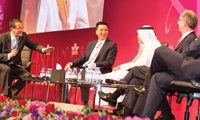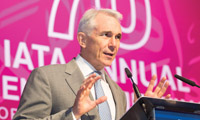IATA AGM Preview
FUTURE THREATS AND SUDDEN CHANGES
When close to 1000 delegates from the world’s aviation industry and the media gathered in Doha last month for the 70th Annual General Meeting of the International Air Transport Association (IATA), one panel discussion took an unexpected turn: the impact of China’s changing economy on airlines.
July 1st 2014
Economists may differ about the trajectory of China’s changing economy, but as far as the airline industry is concerned any downward trend in the Mainland economy will have a significant impact on the airline industry. Read More »
 |
A member of a panel discussing global economic trends at the IATA AGM, Marlos Maratheftis, global head of macro research at Standard Chartered Bank, said a downturn in the Chinese economy is always a risk. “If it happens, we are all in trouble, irrespective of where we sit,” he said.
Maratheftis delivered his view after IATA announced that concerns about China’s economic growth and political risks associated with a downturn were the main reasons it had trimmed $700 million from its global profit for 2014.
| IATA …. on security IATA wants a global approach to improving security. “The industry is secure, but passengers still say that security remains their biggest travel hassle. Inconsistencies across jurisdictions defy understanding. The focus on prohibited objects sees law-abiding passengers treated with criminal suspicion. There is waste and inefficiency,‘‘ said IATA director general and CEO, Tony Tyler. We must do a better job. There is plenty of opportunity for the second century mindset of global collaboration - both among governments and with industry - to make a positive contribution to our efforts to keep flying secure,” said Tyler. IATA is partnering with the Airports Council International (ACI) and others through its Smart Security program, aimed at improving effectiveness, efficiency, and the passenger experience. |
Carriers are now expected to produce a $18 billion profit in 2014, down from the $18.7 billion in its previous forecast, in March. IATA chief economist, Brian Pearce, said world trade had slowed since the last forecast was completed and business confidence had fallen because of worries about China’s economy. On a more optimistic note, Pearce added that global economic prospects are expected to improve as the year progresses.
A snap poll conducted during the IATA economic panel discussion revealed two topics were high on airline’s list of feared threats: China’s economy and the danger of increasing protectionism.
Standard Chartered’s Maratheftis told delegates China is making a transition. “It is changing its economic model, moving away from an economy that is driven by investment, cheap credit and exports and increasingly being driven by consumption domestically and services.” He believed China would be able to cope as long as its growth rate remained above 7%. “Then it will be able to absorb shocks.”
| IATA …. on infrastructure Tyler said governments are often challenged in being able to provide the critical building blocks of global connectivity, cost-efficient airports and air traffic management infrastructure. “In Europe, there is paralysis on the Single European Sky. While the European Commission is pushing, member states are more interested in protecting revenue streams and government jobs. So passengers, the environment, and the European economy all suffer.” He also drew attention to concerns over airspace congestion in the Gulf, the structuring of public-private partnerships for airport development in Asia and Latin America, and the failure of the U.S. government to prioritize investments in the NextGen air traffic management initiative. He advocated effective economic regulation of infrastructure. “The market power that most airports have needs a counter-balance with effective independent regulators applying well established international norms. That will bring about fair charging regimes, which will facilitate the enhanced connectivity that communities everywhere are seeking.” |
Economists also urged airlines to closely monitor economic progress in different regions and nimbly adjust their networks as market circumstances shifted. “Western economies appear to be pulling out of their slump, but we are seeing much more mixed results in emerging markets,” said Andrew Sentence, senior economic adviser at PwC. “Airline chief executives need to ask if they should reconfigure their businesses, because there is more growth in certain parts of the West than the East, he said.”
 |
| IATA director general and CEO, Tony Tyler said: regulatory structures prevent global airline consolidation |
He also warned airlines that oil prices might increase. “Over the last decade or so, whenever the world economy picked up, we saw quite a surge in energy, food and commodity prices. Are airlines robust enough to deal with that?”
Most airline heads say yes they are. Chief executive of Cathay Pacific Airways, Ivan Chu, said fuel was simply part of an airline’s costs. “It’s something you cannot control, it can be very volatile and you have to deal with it. In the last three years it has been very high, but quite stable.”
CEO of British Airways-led International Airline Group (IAG), Willie Walsh, said the fuel price wasn’t the issue, volatility was. “The challenge is to adapt to the volatility. Go back to 2001 when the average price of a barrel of oil was $21.40 and we were an unprofitable industry. Fuel was 12% of our cost base,” Walsh said.
| IATA … on tracking The IATA taskforce on global airline tracking is scheduled to deliver its recommendations to the International Civil Aviation Organisation (ICAO) in September, with the new standards in place by 2016-2017. But Tyler said last month individual airlines could implement the recommendations soon than that. He said IATA’s recommendations to ICAO would be limited to global aircraft tracking and would not extend to continuous streaming of data. He added: “It is the sort of issue that even before regulations start to apply, airlines already would have made arrangements.’’ Industry owned transport communications company, SITA, said it was developing a tracking system which will use technology already installed on aircraft as well as SITA’s dispatch and operations systems. The system is being evaluated by several airlines, SITA said, because it will not involve a big investment from airlines. Given the industry’s modest profit margin, cost will be an issue. “If it is prohibitively expensive, we have to see where the cost benefit is,‘’ said the director general of the Association of Asia-Pacific Airlines (AAPA), Andrew Herdman. “If we ask some governments and some countries to do this, there will be issues of national security and defence to resolve, “ said the chief executive of All Nippon Airways, Osamu Shinobe. Chief executive of IAG, Willie Walsh, said he had no objections to mandatory global tracking of airliners, but it must be a sensible solution and maximise the use of existing technology. Air France said that since the loss of an Air France aircraft over the South Atlantic in 2009, Air France aircraft must transmit their position every ten minutes. Reports are increased to one a minute if there is an abnormal deviation. KLM has decided to follow suit, said the French carrier. |
“Last year fuel was around $111 at 32% of our cost base and we were profitable. In 2001 if you had asked ‘can this industry survive with the price of a barrel of oil at $111’ I suspect most people would have said we could not. We have shown we can adapt, but we struggle to adapt quickly to the volatility of the oil price. Nevertheless, airlines have become much better at adjusting to external shocks.”
Another topic that sparked differences of opinion among airlines was over-capacity, given the large number of aircraft on order. A poll of delegates showed 37% believed there will be capacity issues. “37% are wrong,” insisted Walsh.
 |
| Kylie Minogue delights with “The Locomotion” |
“There is an issue with cargo belly capacity (adding freight capacity to a depressed cargo market), but a lot of the passenger aircraft orders are for replacement, particularly wide-body replacement. A lot of it also will be for growth where there is clearly growth. Where capacity is being added it is being added where it is needed.”
Qatar Airways chief executive, Akbar Al Baker, agreed. “I don’t think there will be any excess in capacity. Airlines don’t buy aeroplanes to park them or put them in the hangar. They buy them because there is a requirement and they have a planned deployment program.
“As far as I am concerned, there is a huge requirement for fleet replacement. With my airline alone over the next ten years we will have to replace 150 aircraft. If you look at the U.S. they have a huge requirement for fleet replacement.”
Cathay’s Chu said people should trust airlines and the market. “Many of us have big orders in place. At Cathay we have a large number of wide-body aircraft on firm order (93 planes to be delivered in the next decade).
“The market will expand at around 4.5 % annually. Some regions will grow faster than others. But we all have a plan. The key word is flexibility to meet market demand. When a market rises we will use new aircraft to cater for that growth. If the market declines, we can basically replace these planes.”
| 'In 2001, if asked if this industry could survive with oil at $111 a barrel, I suspect most people would have said we cannot. We have shown we can adapt, but we struggle to adapt quickly to the volatility of the oil price' |
| Willie Walsh Chairman of International Airline Group |
IATA director general and CEO, Tony Tyler, in his State of the Industry address at Doha, said the global airline industry faced rising infrastructure costs, inefficiencies in air traffic management, a heavy tax burden and costly regulation. He said carriers will report $746 billion in revenues this year, but repeated the industry’s low return on investment.
“The average return on investment in the airline industry in 2014 is 5.4%, much higher than the 1.4% in 2008, but far from the 7%-8% expected by investors,” Tyler said.
The IATA director general said: “The key to unlocking aviation’s future potential is a global mindset supported by strong partnerships. Aviation connects people and business to make ‘global’ possible. Securing aviation’s future begins with some immediate challenges. Airlines must be profitable, safe and secure businesses. We need to provide efficient, customer-focused services. And sustainability must be integral to everything that we do,” said Tyler.
“Our financial performance does not yet match the value that we deliver,” he added. “Our customers expect efficient global connectivity. But the regulatory structure prevents the global consolidation that has happened in other industries. By creatively working together with a global mindset—through alliances, joint ventures, franchising, and domestic consolidation—we are now seeing some significant results.”
He who must be obeyed
Qatar Airways chief executive, Akbar Al Baker, was at his acerbic best when he hosted the world’s airline elite on his home turf of Doha, especially when Gulf carriers were attacked about their funding sources. As news emerged that Etihad Airways, recently revealed to be the recipient of an interest free $3 billion loan from the Abu Dhabi ruling family, was close to securing a $682 million, 49% stake in troubled carrier, Alitalia, rival European airlines had a mixed response. New Lufthansa chief executive, Carsten Spohr, said: “We all read in the papers where the money came from, so I would consider Etihad to be in the ownership of the state, and therefore it’s state money we see flowing here. There are clear laws on state aid from European states to European airlines. These rules must also be applied to state aid from outside Europe,” he declared. Al Baker would not have a bar of that argument. “The EU talks about State aid when it comes to us. What is this double standard? Don’t you think it is a disgrace that they talk about us whilst in their own backyard there are so many airlines getting handouts from their governments, which is straight away State aid. “As far as we are concerned, it is equity by the owner in our airline,” he said. When asked if he would invest in any European airline, Akbar quickly replied: “We only invest in successful airlines, not in failures.” Tim Clark, president of Dubai’s Emirates Airline, also rejected allegations of unfair competition. “My response has always been ‘put up or shut up’. As far as Emirates is concerned... (we say) you must have evidence and support what you are saying. Do not make statements if you can’t support them and if they are commercially damaging.” Not all European carriers were as blunt as Spohr. Willie Walsh, head of International Airline Group (AIG), whose flagship carrier is British Airways, said: “I don’t have a problem with that. Absolutely no issue whatsoever. “They’ve found someone who is willing to invest in them and that person has invested a lot of money and believes the investment will pay off. They are entitled to it. I don’t share that view, but it doesn’t bother me. “It is clear to everybody that Alitalia is going to continue to exist. Given it has received considerable State aid over the years, you could argue if it should be in business today. But it is in business and it will continue to be. Allow them to move on and allow us to compete.” Etihad has yet to conclude the Alitalia deal, but last month the bid moved a step closer to closure when the Italian carrier’s board endorsed Etihad’s rescue plans for the airline. It includes big job cuts and stringent terms for restructuring Alitalia’s debts, which are now $955 million. The carrier has not released its financial results for 2013. In 2012 it lost $382 million. |
The 71st IATA AGM and World Air Transport Summit will be held in Miami, Florida, from June 7-9 2015. It will be hosted by American Airlines, FedEx and UPS, in conjunction with Airlines for America (A4A), the trade association of the U.S. airline industry.